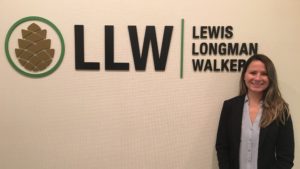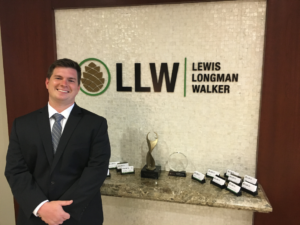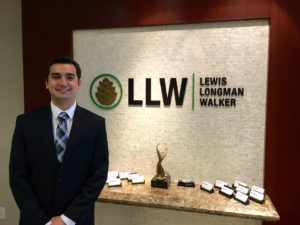2016 Summer Newsletter
Table of Contents:
-
-
- LLW Launches New Firm Website and Brand Refresh
- Richard P. Green Joins LLW
- LLW is one of the “100 Best Law Firms for Female Attorneys” By Law360
- LLW Named One of South Florida Business Journal’s Top Law Firms
- LLW Lawyers Selected to the 2016 Super Lawyers List
- LLW Welcomes Summer Associates
- The Public Records Act – When Good Faith Compliance Is Not Enough!
-
Lewis, Longman & Walker Launches New Firm Website and Brand Refresh
Lewis, Longman & Walker (LLW) recently launched a new website, www.llw-law.com. The new LLW website was designed to create the optimal user experience while providing extensive information regarding LLW’s attorneys, practice areas and industries served. The updated site also incorporates interactive website functionality features such as mobile responsiveness. The new website is part of an overall brand refresh for LLW, with a newly redesigned firm logo that features a modern take on the traditional pinecone. Read more at http://www.llw-law.com/template/our-logo/.
Established in 1994, LLW has grown into a law firm with 34 attorneys in four offices throughout the state. “Our firm has evolved so much in the last few years, a dynamic new look was necessary to showcase who we are today” said Michelle Diffenderfer, President and Shareholder of LLW.
While the logo has changed, LLW’s values remain the same – to provide innovative and winning solutions for clients. For more information, contact Kellie Erlacher at kerlacher@llw-law.com.
Richard P. Green Joins LLW
Lewis, Longman & Walker, P.A. is pleased to announce that Richard P. Green has joined the firm’s Tampa Bay office as an associate. Mr. Green’s practice focuses on state and federal civil litigation and has extensive experience using alternative dispute resolution such as arbitration and mediation.
He received his law degree from the Louis D. Brandeis School of Law at the University of Louisville in Kentucky. Richard is admitted to practice in Florida, Kentucky, and Indiana, is a commissioned Blackstone Fellow, and is a member of the Board of Directors of the Bluegrass Center for Autism. He can be reached at (941) 708-4040 or at rgreen@llw-law.com.
Lewis, Longman & Walker is One of the “100 Best Law Firms for Female Attorneys” By Law360
Lewis, Longman & Walker was recently listed as one of Law360’s 100 Best Law Firms for Female Attorneys. Law360 ranked firms by examining a variety of factors, such as the percentage of partners, both equity and non-equity, who are women; the percentage of associate-level attorneys who are women; and the divide between those two. For the firms that nabbed spots on the list, the number of women at all levels of the firm shows that firm leaders are finding some new ways to open doors and increase diversity. The ranking also takes into account female attorneys in leadership positions. At LLW, the firm President is female and three-quarters of the firm’s Executive Committee are women.
The 100 firms that are included on this list are working to buck the industry’s overall trend. Law360’s 2016 Glass Ceiling report found that just 34 percent of all attorneys and a mere 22 percent of partners at the U.S. law firms surveyed by Law360 are women. Those numbers have barely budged over the past few years, indicating that the legal industry has struggled to make much progress in giving women new opportunities to shine in the profession. To view the full list, visit Law360 Rankings.
LLW Named One of South Florida Business Journal’s Top Law Firms
Lewis, Longman & Walker was recently included in the 2016 Top Law Firms List, published by the South Florida Business Journal. LLW has been included in the Top Law Firms list since its inaugural edition in 2014. South Florida law firms are ranked by the total number of attorneys, shareholders, staff and South Florida offices. To view the full list, visit South Florida Business Journal’s Top Law Firms.
LLW Lawyers Selected to the 2016 Super Lawyers List
LLW shareholders have been selected to the 2016 Super Lawyers list. Michelle Diffenderfer, Terry E. Lewis, Stephen A. Walker and Alfred J. Malefatto from the firm’s West Palm Beach office, Anne Longman from the Tallahassee office and Wayne E. Flowers from the Jacksonville office.
These LLW shareholders share this Super Lawyers designation with only 5% of the attorneys in Florida. Super Lawyers are nominated by fellow attorneys who have personally observed them in action, whether as opposing counsel, co-counsel or through other firsthand observations in the courtroom. The background and professional achievement of each candidate are researched before the final decision is made to include the attorneys in this list. For more information, please visit our website at www.llw-law.com or www.superlawyers.com.
LLW Welcomes Summer Associates
Lewis, Longman & Walker is pleased to welcome three law school students to the firm to participate in its 10-week Summer Associate Program. The program, open to first-year and second-year law students, is an opportunity for participants to gain hands-on legal experience and build relationships with industry professionals.
LLW is pleased to welcome the following Summer Associates to its West Palm Beach and Tampa Bay offices:
TAMPA BAY OFFICE
Meghan Hennessy is a law student in the Class of 2017 at the University of Texas School of Law, where she is a staff editor of the Texas Review of Entertainment and Sports Law and the American Journal of Criminal Law. She holds a Bachelor of Science degree in Political Science and Psychology from Florida State University.
WEST PALM BEACH OFFICE
Ian Maiolo is a law student in the Class of 2017 at the University of Miami School of Law. He holds a Bachelor of Arts degree in Political Science from the University of Florida, where he was a member of Pi Sigma Alpha, the Pre-Legal Honor Society and Delta Epsilon Iota.
John Vander Wagen is a law school student in the Class of 2018 at George Washington University Law School, where he is a member of the Student Intellectual Property Law Association, a 1L representative of the Cyperlaw Students Association and a member of the Space Law Society. He holds a Bachelor of Science degree in Mechanical Engineering from the University of Florida.
The Public Records Act – When Good Faith Compliance Is Not Enough!
For the governmental entities subject to the Public Records Act, compliance can be challenging. Must a fire district respond to the public records request asking for every record with the word “fire” in it? Yes! What if you produce thousands, but accidentally miss some? If a court finds a local government violated the Act, regardless if the government made a good faith attempt to comply – the local government may have to pay the requester’s reasonable attorney’s fees!
As many of you know, local governments are subject to the Public Records Act (Chapter 119 of the Florida Statutes). The purpose of the Public Records Act is to provide the public with access to its government – to provide transparency in government. Earlier this month, the Florida Supreme Court issued an opinion, Board of Trustees, Jacksonville Police & Fire Pension Fund, etc. v Lee, No. SC13-1315 (Fla. April 14, 2016), wherein the Court considered whether a prevailing party in a public records case was entitled to a statutory award of attorney’s fees when the public agency acted in good faith but violated the Public Records Act.
This question arose out of a request by Curtis W. Lee, the Respondent, for public records from the Board of Trustees, Jacksonville Police and Fire Pension Fund (the “Pension Fund”). Mr. Lee did not follow certain conditions imposed by the Pension Fund prior to allowing the inspection and copying of public records. As such, the Pension Fund refused to allow Mr. Lee to inspect or copy the requested records. Eventually, Mr. Lee went to court and argued that the conditions and fees imposed by the Pension Fund prior to allowing inspection or copying of public records were not legally valid. The trial court and First District Court of Appeals held that some of the conditions were valid, but ultimately determined that an hourly photocopying fee and an hourly supervisory fee violated the Public Records Act. Mr. Lee moved for attorney’s fees under Section 119.112 of the Florida Statutes. The trial court concluded that the violations of the Public Records Act were “not knowing, willful or done with a malicious intent,” and did not amount to an “unlawful refusal” as required for an award of attorney’s fees. On appeal, the First District Court of Appeals reversed the trial court’s order and the Supreme Court of Florida agreed based on the following analysis.
The Supreme Court found if a public record is not made available as required by the Public Records Act, an accelerated civil action process is available for immediate enforcement of the Act and an award of attorney’s fees if the agency has “unlawfully refused” to make the public record available. The Pension Fund argued that for Mr. Lee to prevail on his motion for attorney’s fees, he would need to demonstrate that “unlawful refusal” equated to the agency acting unreasonably or in bad faith in its refusal to make available the public records. However, the Supreme Court, based on the tenants of statutory construction, found that a public agency’s unreasonableness or bad faith is not required before awarding attorney’s fees pursuant to the Act. Even if the actions were not malicious, if the agency violated the Public Records Act then its actions were unlawful. Unlawful actions have the effect of frustrating the public right to access public records, requiring the “courts to vindicate that right,” and thus, “reasonable attorney’s fees should have been awarded.”
For more information, please contact Nicole Poot at (941) 708-4040.




